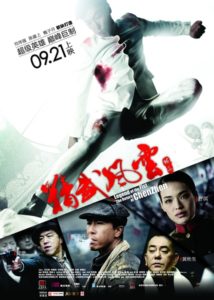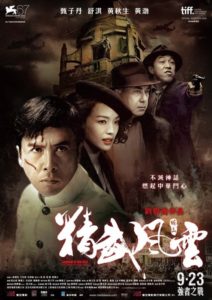Legend of the Fist: The Return of Chen Zhen
精武风云 陈真
Hong Kong/China, 2010, colour/b&w, 2.35:1, 104 mins.
Director: Liu Weiqiang 刘伟强 [Andrew Lau].
Rating: 6/10.
Technically flashy sequel to the 1972 Fist of Fury, this time with Zhen Zidan [Donnie Yen] kicking Japanese arse in pre-WW2 Shanghai.
France, 1917. Jing Wu School martial-arts student Chen Zhen (Zhen Zidan), believed dead after avenging his master’s death at the hands of Japanese in Shanghai, is one of many Chinese sent by their government to fight alongside the Allies during WW1. During a bombing attack, Chen Zhen successfully rallies his Jing Wu comrades against the Germans, though one of them, Qi Tianyuan, dies. Shanghai, 1925. Tensions are mounting between China and Japan in Manchuria, but in Shanghai, with its international settlements, it’s business as usual. In the British-American concession, wealthy businessman Liu Yutian (Huang Qiusheng) runs the Casablanca nightclub, where  the star act is chanteuse Kiki (Shu Qi) who, along with others there, is secretly spying for the Japanese. Under the name of his dead friend Qi Tianyuan, Chen Zhen now leads an anti-Japanese group that includes his Jing Wu comrades; he ingratiates himself with Liu Yutian one night and is taken on as a partner in Casablanca. During an assassination attempt on a Chinese army general organised by the Japanese, Chen Zhen adopts the persona of a well-known movie character, the Masked Warrior, and saves the general. When the Japanese start mass assassinations throughout the city, Chen Zhen’s Masked Warrior becomes a popular hero but can’t stop the flood of killings and emigrations. Meanwhile, Kiki has started becoming friendly with Chen Zhen to discover his real identity, and ruthless Japanese intelligence chief Chikaraishi (Kohata Ryuichi) has his own reasons for finding and destroying Chen Zhen.
the star act is chanteuse Kiki (Shu Qi) who, along with others there, is secretly spying for the Japanese. Under the name of his dead friend Qi Tianyuan, Chen Zhen now leads an anti-Japanese group that includes his Jing Wu comrades; he ingratiates himself with Liu Yutian one night and is taken on as a partner in Casablanca. During an assassination attempt on a Chinese army general organised by the Japanese, Chen Zhen adopts the persona of a well-known movie character, the Masked Warrior, and saves the general. When the Japanese start mass assassinations throughout the city, Chen Zhen’s Masked Warrior becomes a popular hero but can’t stop the flood of killings and emigrations. Meanwhile, Kiki has started becoming friendly with Chen Zhen to discover his real identity, and ruthless Japanese intelligence chief Chikaraishi (Kohata Ryuichi) has his own reasons for finding and destroying Chen Zhen.
REVIEW
Though there’s almost 40 years between the two films’ production, the patriotic, furiously anti-Japanese flame of Fist of Fury 精武门 (1972) burns just as brightly in Legend of the Fist: The Return of Chen Zhen 精武风云 陈真, which has the audience believe that the character played by Li Xiaolong 李小龙 [Bruce Lee] survived the hail of bullets at the end of Fury and, after a spell on the battlefields of Europe during WW1, returned incognito to Shanghai to kick more Japanese arse and again cry, “China is not the Sick Man of Asia!” With China’s economic ascendancy and new confidence, patriotic, anti-Japanese movies have become a growing trend in Hong Kong/Mainland co-productions, but the difference between, for instance, the xenophobic Ip Man 叶问 films and this one by director/d.p. Liu Weiqiang 刘伟强 [Andrew Lau] is that Liu’s has no retro ambitions, no desire to meticulously re-create Hong Kong productions of the early 1970s and their clean, uncluttered style.
Legend of the Fist is a breathlessly paced, in-your-face, chaotically structured, big-budget action movie that’s more reminiscent of late 1980s/early 1990s Hong Kong cinema if anything. It’s not un-entertaining at a pulp level, and certainly never leaves time to get bored. But with this cast (Zhen Zidan 甄子丹 [Donnie Yen], Shu Qi 舒淇, Huang Qiusheng 黄秋生 [Anthony Wong], Huang Bo 黄渤), those sets (including the huge backlot from Bodyguards and Assassins 十月围城, 2009), and such behind-the-camera talent (including co-writer and producer Chen Jiashang 陈嘉上 [Gordon Chan], who also did a Chen Zhen tale, Fist of Legend 精武英雄, 1994, starring Li Lianjie 李连杰 [Jet Li], over a decade ago), it could have been much, much better.
Starting with B&W documentary footage, the script intriguingly digs up the little-known fact that 150,000 Chinese were sent to the battlefields of Europe to work alongside the Allies during WWI. The fact that, years later, Europe doesn’t come to China’s help when it needs it against the Japanese is key to Chen Zhen’s self-sufficient psychology, but is given no time to develop in the opening scenes: within minutes, Chen Zhen is abseiling across the battlefield and demolishing Germans – in probably the first on-screen meeting of martial arts and WWI. From thereon, Liu and editor Zhong Weizhao 钟炜钊 [Azrael Chung] rarely let the pace slacken for a second, let alone a minute, as glitzy 1920s Shanghai swings into view, Taiwan’s Shu and Hong Kong’s Huang both have enormous fun playing a nightclub singer and her smooth, super-rich boss, and Zhen becomes an avenging hero in a disguise straight out of The Green Hornet 青蜂侠 (1994) and Black Mask 黑侠 (1996).
The film is so littered with half-developed characters and subplots, and ends so suddenly (with an apparent set-up for a sequel), that heavy editing during postproduction may be responsible for much of the jerky pacing, lack of any dramatic depth and barely motivated plot swings. Zhen’s whiplash martial arts style is hardly showcased in two big setpieces (a street assassination attempt; a raid on Chen Zhen’s HQ) which are excitingly cut but give little idea of the actor’s physical skills. Much better is the 10-minute finale where Zhen’s hero finally takes on the Japanese heavies in their own dojo, which is shot and edited with more respect for fighting techniques than just flashy visuals. Here, Zhen shows a curled power and concentration that do bring back memories of Li, even though Zhen is in no way trying to mimic him.
With Liu also in charge of the camera, the film expectedly looks great on the wide screen. But despite all the nighttime shooting, all the rain, the busy symphonic score by Hong Kong’s Chen Guangrong 陈光荣, the hard-as-nails soundtrack, and the good-looking sets by Lin Ziqiao 林子侨 and costumes by Wu Lilu 吴里璐 [Dora Ng], the film has no real atmosphere beyond its surface glitter: East Wind Rain 东风雨 (2010) and Shanghai 谍海风云 (2010) both portrayed the era with more real drama than this.
CREDITS
Presented by Media Asia Films (HK), Enlight Pictures (CN), Shanghai Film Media Asia (CN). Produced by Basic Pictures (HK).
Script: Zhang Zhicheng, Chen Jiashang [Gordon Chan], Lv Guannan, Tan Guangyuan. Photography: Liu Weiqiang [Andrew Lau], Wu Wenzheng. Editing: Zhong Weizhao [Azrael Chung]. Music: Chen Guangrong. Art direction: Lin Ziqiao. Costume design: Wu Lilu [Dora Ng]. Sound: George Lee, Zeng Jingxiang [Kinson Tsang]. Action: Zhen Zidan [Donnie Yen]. Choreography: He Huachao, Liang Shiyun. Visual effects: Lin Jiale (Menfond Electronic Art & Computer Design).
Cast: Zhen Zidan [Donnie Yen] (Chen Zhen), Shu Qi (Qiqi/Kiki/Fang Qing/Yamaguchi Yumi, captain), Huang Qiusheng [Anthony Wong] (Liu Yutian), Huang Bo (Huang Haolong), Kohata Ryu (Chikaraishi Takeshi, colonel), Huo Siyan (Weiwei/Vivian), Zhou Yang (Qi Zhishan, Chen Zhen’s “sister”), Kurata Yasuaki (Chikaraishi Tsuyoshi, Takeshi’s father), Chen Jiajia (Huang Lan, cigarette girl/Unko), Yu Wenle [Shawn Yue] (Zeng, general), Ma Yue (Zhuo, general), Zhang Songwen (Wenzai), Lv Xiaolin (Qiuting, student leader), Ma Su (Zhuo’s wife), Liu Tao (assistant editor), Huang Xiaolei (dance girl).
Premiere: Venice Film Festival (co-opening film), 1 Sep 2010.
Release: Hong Kong, 23 Sep 2010; China, 21 Sep 2010.
(Review originally published on Film Business Asia, 2 Sep 2010.)
